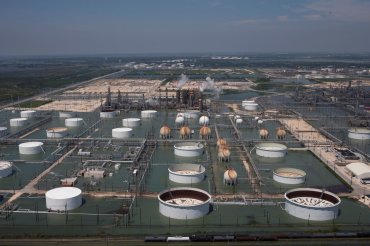A week after Hurricane Harvey stopped drenching the U.S. Gulf Coast, there were signs of good news for the lubricants industry as refineries containing the nations two largest base oil plants moved to reopen.
Motiva said yesterday that it was in the final stages of assessing equipment and initial stages of restarting operations at its Port Arthur, Texas, refinery, home of a 40,300 barrel per day API Group II base oil plant. In a press release the company said it expected the refinery to be operating at 40 percent of capacity by Sunday.
Meanwhile, ExxonMobil said it was assessing facilities and restarting operations at its Baytown, Texas, refinery, which includes a 28,000 b/d Group I and II plant.
Neither company commented specifically on the status of their base oil plants, which together account for 24 percent of U.S. base oil capacity.
Industry sources have said estimated that global base oil markets would be impacted if base oil plants forced by Harvey to shut down remained closed for two weeks or more.
The question is, when will plants be back online, Jim Kudis, president of Allegheny Petroleum Products Co., said Friday. Allegheny is an independent blender based in Wilmerding, Pennsylvania. I hope people are okay and that theres not too much damage, but in terms of our business, I want to know when I can get product from them.
Not surprisingly, lubricant companies supplied by the closed plants are most vulnerable to impacts from disruptions in their operations, industry insiders said.
Right now, parts of the U.S. supplied by the Houston region will be using their stocks and then the stocks of their distributors, said Annie Jarquin, director of Kline & Co. consultancys Energy Practice. She predicted that plants will bounce back quickly after the flood waters recede but added that problems could still arise due to the time it takes to replenish stock levels.
Lube companies are also worried about the state of plants that supply additives or chemicals used to make additives. Lubrizol said its additive plant in Deer Park, Texas – the companys main facility in North America – was closed and sustained a small amount of damage. The storm also forced the closing of numerous petrochemical refineries that produce building blocks for materials such as detergents, dispersants and emulsifiers used in the production of lubricants, as well as glycols, synthetic esters and polyalphaolefins.
Its not just base oils, said Ronald M. Powell, president of Moroil Technologies, an independent blender in Concord, North Carolina. Additives are also an issue, and you need to consider not only supply of additive packages but also individual components. Lubrizol and other large additive companies supply additive packages used in such high-volume types of lubricants as engine oils, but many independent lubricant manufacturers purchase individual additive components to make various types of industrial lubes.
It may be too soon to know the extent of disruption in availability of such materials, but blenders said theyve already begun making contingency plans.
I imagine most companies are identifying their critical raw materials and looking at how those are sourced and where they are produced, Powell said Friday. And if they have materials that are coming from the Gulf, they are doing whatever is prudent to try to make sure that their supply of those materials is not interrupted.
– Joe Beeton, Boris Kamchev, Gabriela Wheeler and George Gill contributed to this report
Photo: Adrees Latif/Reuters/Newscom
